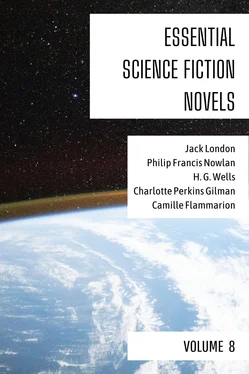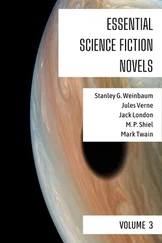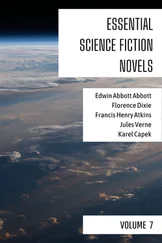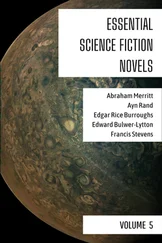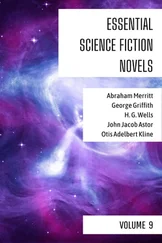Psychology furnishes some interesting contributions to recent fiction along the line of what might be called momentary or instantaneous plots. Ambrose Bierce’s The Occurrence at Owl Creek Bridge is a good example,—where a man is being hanged and in the instant between the drop from the bridge and the breaking of the neck he lives through long and dramatic adventures, escaping his pursuers by falling into the river and swimming ashore, reaching home at last to greet his wife and children. Yet in a second his lifeless body swings from the bridge. The Warning , by Josephine Daskam Bacon, shows the case of a man who lives years in another country during a few moments of acute mental strain carried to the point of paranoia. Barry Pain has a story where in the time in which a man drives home from the theater he visits another planet and changes the current of his life, while Algernon Blackwood compresses a great experience into a few minutes of dreaming.
One noteworthy point in connection with the scientific supernaturalism is that these themes appear only in novels and short stories. They do not cross over into poetry as do most of the other forms of the ghostly art. Perhaps this is because the situations are intellectual rather than emotional, brain-problems or studies in mechanisms rather than in feelings or emotions. The province of science is removed from that of poetry because the methods and purposes are altogether different. The scientific methods are clear-cut, coldly intellectual. Science demands an exactness, a meticulous accuracy hostile to poetry which requires suggestion, vagueness, veiled mystery for its greatest effect. The Flower of Silence , for instance, would be a fitting title for a poem, but the poetic effect would be destroyed by the need for stating the genus and species of the orchid and analyzing its destruction of human tissue. Nature’s mysterious forces and elements in general and vaguely considered, veiled in mists of imagination and with a sense of vastness and beauty, are extremely poetic. But the notebook and laboratory methods of pure science are antagonistic to poetry, though they fit admirably into the requirements of fiction, whose purpose is to give an impression of actuality.
Another reason why these scientific themes do not pass over into poetry may be that scientific methods as we know them are new, and poetry clings to the old and established conventions and emotions. There is amazing human interest in these experiments, a veritable wealth of romance, with dramatic possibilities tragic and comic, yet they are more suited to prose fiction than to poetry. We have adapted our brain-cells to their concepts in prose, yet we have not thus molded our poetic ideas. It gives us a shock to have new concepts introduced into poetry. An instance of this clash of realism with sentiment is shown in a recent poem where the setting is a physics laboratory. Yet in a few more decades we may find the poets eagerly converting the raw materials of science into the essence of poetry itself, and by a mystic alchemy more wonderful than any yet known, transmuting intellectual problems of science into magic verse. Creation , by Alfred Noyes, is an impressive discussion of evolution as related to God.
Perhaps another reason why these themes have not been utilized in poetry is because they are too fantastic, too bizarre. They lack the proportion and sense of artistic harmony that poetry requires. Strangeness and wonder are true elements of poetry, and magic is an element of the greatest art, but in solution as it were, not in the form observed in science. The miracles of the laboratory are too abrupt, too inconceivable save by intellectual analysis, and present too great a strain upon the powers of the imagination. They are fantastic, while true poetry is concerned with the fancy. Magic and wonder in verse must come from concepts that steal upon the imagination and make appeal through the emotions. Thus some forms of supernaturalism are admirably adapted to the province of poetry, such as the presence of spirits, visitations of angels or demons, ancient witchcraft, and so forth. The elements that have universal appeal through the sense of the supernatural move us in poetry, but the isolated instances, the peculiar problems that occur in scientific research if transferred to poetry would leave us cold. Yet they may come to be used in the next vers libre .
Nor do these situations come over into the drama save in rare instances. Theodore Dreiser, in a recent volume, Plays of the Natural and the Supernatural , makes use of certain motifs that are striking and modern, as where a physician goes on the operating-table, the dramatis personæ including Demyaphon (Nitrous Acid), and Alcepheron (a Power of Physics), as well as several Shadows, mysterious personages of vagueness. These Shadows here, as in The Blue Sphere , are not altogether clear as to motivation, yet they seem to stand for Fate interference in human destiny. In the latter play Fate is also represented by a Fast Mail which is one of the active characters, menacing and destroying a child.
One reason why these motifs of science are not used in drama to any extent is that they are impossible of representation on the stage. Even the wizardry of modern producers would be unable to show a Power of Physics, or Nitrous Acid, save as they might be embodied, as were the symbolic characters in Maeterlinck’s Blue Bird , which would mean that they would lose their effect. And what would a stage manager do with the rhythm of the universe, which enters into Dreiser’s play? Many sounds can be managed off stage, but hardly that, one fancies. These themes are not even found in closet drama, where many other elements of supernaturalism which would be difficult or impossible of presentation on the stage trail off. William Sharp’s Vistas , for instance, could not be shown on the stage, yet the little plays in that volume are of wonderful dramatic power. The drama can stand a good deal of supernaturalism of various kinds, from the visible ghosts and devils of the Elizabethans to the atmospheric supernaturalism of Maeterlinck, but it could scarcely support the presentations of chemicals and gases and supernatural botany and biology that fiction handles with ease. The miraculous machinery would balk at stage action. Fancy the Time Machine staged, for instance!
We notice in these scientific stories a widening of the sphere of supernatural fiction. It is extended to include more of the normal interests and activities of man than has formerly been the case. Here we notice a spirit similar to that of the leveling influence seen in the case of the ghosts, devils, witches, angels, and so forth, who have been made more human not only in appearance but in emotions and activities as well. Likewise these scientific elements have been elevated to the human. Supernatural as well as human attributes have been extended to material things, as animals are given supernormal powers in a sense different from and yet similar to those possessed by the enchanted animals in folk-lore. Science has its physical as well as psychic horrors which the scientific ghostly tales bring in.
Not only are animals gifted with supernatural powers but plants as well are humanized, diabolized. We have strange murderous trees, vampire orchids, flowers that slay men in secret ways with all the smiling loveliness of a treacherous woman. The dæmonics of modern botany form an interesting phase of ghostly fiction and give a new thrill to supernaturalism. Inanimate, concrete things are endowed with unearthly cunning and strength, as well as animals and plants. The new type of fiction gives to chemicals and gases a hellish intelligence, a diabolic force of minds. It creates machinery and gives it an excess of force, a supernatural, more than human cunning, sometimes helpful, sometimes dæmonic. Machines have been spiritualized and some engines are philanthropic while some are like damned souls.
Читать дальше
